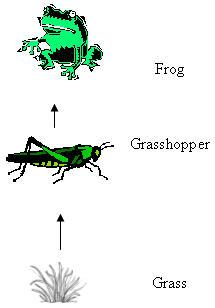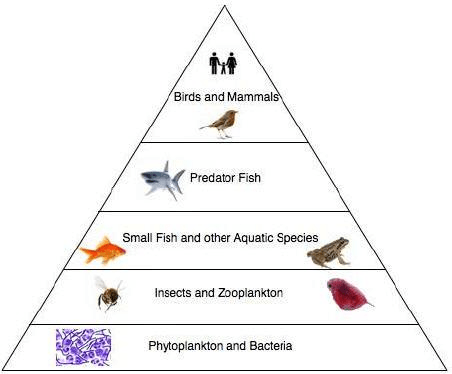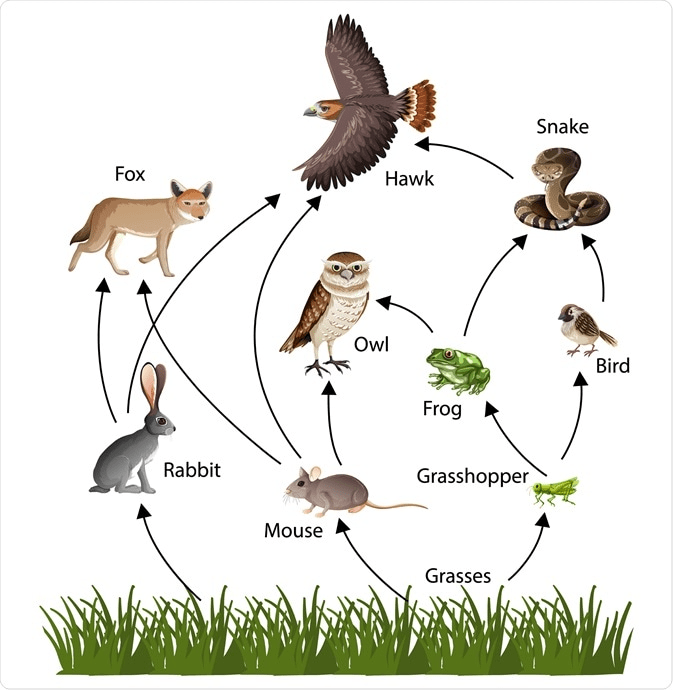Living factors in an environment.
A. Environmental Factors
B. Biotic Factors
C. Climate Factors
D. Abiotic Factors
B. Biotic Factors
What percent of energy is passed on from one trophic level to the next?
10%
Barnacles create home sites by attaching themselves to whales. Mutualism, parasitism, or commensalism?
Commensalism
True or False: Evaporation is liquid water to gas and condensation is gas to liquid water.
True
What year was the Clean Water Act implemented?
A. 1929
B. 1962
C. 1848
D. 1948
D. 1948
If you visited a savanna, you would likely see
A. large herds of grazing animals, such as rhinos, gazelles, and giraffes
B. dense forest
C. snow and ice
D. a coastal ecosystem
A. A. large herds of grazing animals, such as rhinos, gazelles, and giraffes
Based on the food chain, identify the primary consumer.

a. frog c. grass
b. grasshopper d. sunlight
c. grass
Ticks feed on deer blood to the deer’s detriment. Mutualism, parasitism, commensalism.
Parasitism
What process carries pollutants to lakes, rivers, and oceans?
A. Precipitation
B. Run off
C. Groundwater
D. Evaporation
B. Run off
What organization monitors water and air quality by taking data on the emissions?
A. NBA
B. EPA
C. EPO
D. FWC
B. EPA (Environmental Protection Agency)
Taiga is
A. a cold, treeless, desert-like biome found near the North and South Poles.
B. found mostly in Africa.
C. a forest biome dominated by coniferous trees, such as pine, fir, and spruce.
D. a dry, rocky biome found in the central part of South America
C. a forest biome dominated by coniferous trees, such as pine, fir, and spruce.

A food pyramid is sometimes used to show both the flow of matter and energy in an ecosystem. The pyramid narrows as matter and energy flow from the bottom to the top. What does this pyramid tell you about the energy in this ecosystem?
a. Energy stays the same, and only the number of living things change.
b. Energy decreases from bottom to top because some is used at each level for life processes.
c. Energy increases from bottom to top because the organisms get larger in size.
d. Energy increases from bottom to top because some is gained at each level.
b. Energy decreases from bottom to top because some is used at each level for life processes.
The stork uses its saw-like bill to cut up the dead animals it eats. As a result, the dead animals carcass is accessible to some bees for food and egg laying. Mutualism, parasitism, or commensalism?
Mutualism
How do consumers get the nitrogen they need?
A. Breathing
B. Eating Plants
C. Eating Dirt
D. Photosynthesis
B. Eating Plants
What organization regulates the amount of fish that are harvested for an area?
A. EPA
B. MLB
C. NOAA
D. NAAO
C. NOAA ( National Oceanic and Atmospheric Administration)
Animals that have thick, scaly skin to prevent water loss would most likely be found in a(n)____________________ biome.
A. Deciduous Forest
B. Tropical Rainforest
C. Tundra
D. Desert
D. Desert
Photosynthesis creates food for what type of organisms in a food web/chain?
A. Producers
B. Detritivores
C. Consumers
D. Decomposers
A. Producers
The process in which two organisms gradually change together at the same time to better meet the needs of their relationship is called?
A. Competition B. Predation
C. Symbiosis D. Coevolution
D. Coevolution
Which of the following puts carbon back into the atmosphere?
A. Photosynthesis
B. Absorption
C. Sublimation
D. Cellular Respiration
D. Cellular respiration
Which of the following is NOT a component of a management plan?
A. Monitor and assess progress in an area
B. Describe and assess trends in that area
C. Add agents to an area for 24/7 surveillance of farmers
D. Find goals to reach for populations and habitats
C. Add agents to an area for 24/7 surveillance of farmers
Describe the climate of a rainforest.
Answers vary
The rabbit in this food web is a what?
A. Producer
B. Primary Consumer
C. Secondary Consumer
D. Tertiary Consumer
B. Primary Consumer
Name one adaptation a prey could have to better protect itself from predators.
Answers Vary
What organism is important in changing atmospheric nitrogen into a form usable by plants?
A. Mushrooms
B. Bunnies
C. Birds
D. Bacteria
D. Bacteria
A volcano erupts leaving behind a hill of lava rock that has cooled down. Lichen begin to pop up in this area breaking down this newly formed rock into soil. What type of succession is this?
Primary Succession